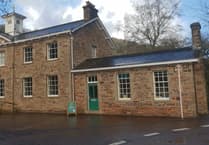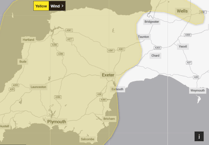MORE than two-thirds of people living in West Somerset were this week ruled out of qualifying for a major new source of European money.
Political shockwaves resounded across the district as the Government announced areas recommended for European Union Objective 2 status.
However, there was delight at the proposed designation of Porlock, Dulverton, Old Cleeve, Haddon, Aville Vale, Holnicote, and Exmoor.
Objective 2 will succeed Objective 5B designation which has been in place for the past five years and runs out at the end of the year.
It will see £108 million of European money made available across the whole of the South West over the next seven years.
Communities which previously qualified for Objective 5b funding would continue to receive some transitional support for up to six years.
The European Commission for Regional Funding now has to decide whether to accept the UK Government's recommendations.
Failure by Minehead to gain Objective 2 status could see the end of plans to build a pier and provide a cross-channel ferry service to Wales.
For Watchet, it could spell doom for hopes of regenerating the town's economy - even if a controversial Objective 5B-funded marina was built.
West Somerset district Cllr Nick Messarra, who is also vice-chairman of Minehead Chamber of Commerce, launched an immediate campaign to overturn the Government's recommendations.
Cllr Messarra was stunned Minehead should be left out at such a crucial and sensitive time for the town's economy.
He said: "We have so many plans and ideas for improving things that it is vital we continue to be eligible for European money.
"I hope everybody will pull together on this one and make sure Deputy Prime Minister John Prescott and Trade and Industry Secretary Stephen Byers are told exactly how important it is for them to change their minds.
"Sooner or later, the Government has to wake up and recognise the fact that West Somerset is an area which desperately needs help.
"We are doing as much as we can on our own but we cannot do it all."
Cllr Messarra was backed by Tory Euro MP Neil Parish, who spoke from his office in Brussels, and he was also contacting Liberal Democrat Euro MP Graham Watson and local Conservative MP Tom King.
Mr Parish told the Free Press: "We need to lobby the Government even at this late stage to get them to include Minehead and Watchet.
"It is unfortunate that they have possibly been traded off for other areas. I shall be contacting Government Ministers and Tom King.
"The Government has made a wrong decision here and we need to put political pressure on them.
"There is a need for the rural type of economies to be supported more than ever because of the agricultural recession and everything else."
District council spokesman Julie Hill said the authority was writing to Mr King and the area's other MP Jackie Ballard for clarification of the situation.
Council cabinet member Cllr Geoff Day said: "West Somerset has a good track record in attracting external funds but nobody should under-estimate the major difficulties in generating funding to sustain and improve the rural economy.
"Clearly, we are pleased to have the more rural parts of the district recommended.
"Even so, we are disappointed the two main areas of population are not included."
Cllr Day said the next step for areas included in the designation was to prepare proposals to improve business competitiveness and initiatives to further develop opportunities for tourism and agriculture.
He said the omissions made a forthcoming review of European LEADER Project funding even more important.
"We need to ensure the projects we submit are good enough to merit support and that every potential funding avenue is explored," he said.
Exmoor National Park Authority chairman Cllr Humphrey Temperley, who is also chairman of Somerset County Council's Europe Board, warned the situation could have been far worse.
Cllr Temperley said it looked in July as if the whole of West Somerset and Exmoor would be by-passed in the European funding proposals.
However, campaigning by the county council helped swing it around to ensure 60 per cent of the area geographically was covered.



